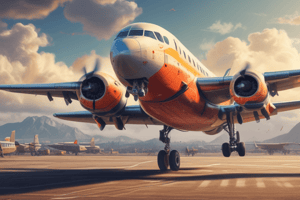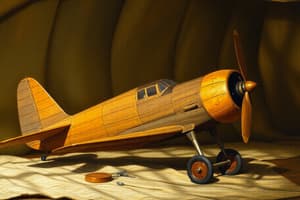Podcast
Questions and Answers
What was a prominent design trend for aircraft into the 1930s?
What was a prominent design trend for aircraft into the 1930s?
- Increased use of fabric-covered truss designs
- Focus on bi-wing aircraft configurations
- Development of heavier wooden structures
- A tendency toward cleaner mono-wing designs (correct)
Which of the following aircraft was the first to utilize composite structures?
Which of the following aircraft was the first to utilize composite structures?
- Curtiss HS-2L
- De Havilland Mosquito (correct)
- Cessna Citation Mustang
- Breguet 14
What was a key development in aircraft design during WWII?
What was a key development in aircraft design during WWII?
- Return to biplane configurations
- Focus on lighter-than-air vehicles
- Increased reliance on fabric and truss designs
- Innovation in all-metal technology (correct)
What was the impact of jet travel on wing design?
What was the impact of jet travel on wing design?
How are lighter-than-air vehicles differentiated from other aircraft?
How are lighter-than-air vehicles differentiated from other aircraft?
Which construction technique was utilized in the Cessna Citation Mustang?
Which construction technique was utilized in the Cessna Citation Mustang?
What major aircraft design approach increased during the 1960s?
What major aircraft design approach increased during the 1960s?
What was a challenge faced by aircraft designers in response to the need for higher flight speeds?
What was a challenge faced by aircraft designers in response to the need for higher flight speeds?
What was a significant design difference of Louis Bleriot's aircraft compared to earlier designs?
What was a significant design difference of Louis Bleriot's aircraft compared to earlier designs?
What material shift occurred in aircraft construction leading up to World War I?
What material shift occurred in aircraft construction leading up to World War I?
What characteristic of high-camber wings was enhanced during WWI?
What characteristic of high-camber wings was enhanced during WWI?
What was a key development in aircraft design post-World War II?
What was a key development in aircraft design post-World War II?
What type of stress is primarily associated with pulling forces that attempt to separate materials?
What type of stress is primarily associated with pulling forces that attempt to separate materials?
What construction method gained prominence by the 1920s in aircraft manufacturing?
What construction method gained prominence by the 1920s in aircraft manufacturing?
Which stress involves both compression and tension acting on a material?
Which stress involves both compression and tension acting on a material?
What forces are structural members of an aircraft primarily designed to withstand?
What forces are structural members of an aircraft primarily designed to withstand?
Which material innovation helped reduce cracking in aircraft structures?
Which material innovation helped reduce cracking in aircraft structures?
What design features were introduced to account for pressurization in aircraft?
What design features were introduced to account for pressurization in aircraft?
In the context of aircraft fuselage, what is its primary purpose?
In the context of aircraft fuselage, what is its primary purpose?
Which of the following stresses acts along an imaginary line when shearing forces are applied?
Which of the following stresses acts along an imaginary line when shearing forces are applied?
Which statement about the Fokker DR-1 is correct?
Which statement about the Fokker DR-1 is correct?
What happens to a rod under compression?
What happens to a rod under compression?
In a multiengine aircraft, where can engines be positioned relative to the fuselage?
In a multiengine aircraft, where can engines be positioned relative to the fuselage?
Among the following stresses, which one is NOT typically a primary consideration for structural design in aircraft?
Among the following stresses, which one is NOT typically a primary consideration for structural design in aircraft?
What is the purpose of fairings on struts and attach fittings?
What is the purpose of fairings on struts and attach fittings?
What role do wing spars serve in the construction of an aircraft wing?
What role do wing spars serve in the construction of an aircraft wing?
Which of the following materials is most commonly used in wing construction?
Which of the following materials is most commonly used in wing construction?
How do wing ribs contribute to wing structure?
How do wing ribs contribute to wing structure?
What type of wing design incorporates only one main spanwise member?
What type of wing design incorporates only one main spanwise member?
What is a characteristic feature of semicantilever wings?
What is a characteristic feature of semicantilever wings?
Which design allows a combination of materials for strength-to-weight performance in wings?
Which design allows a combination of materials for strength-to-weight performance in wings?
What do 'jury struts' do in the construction of an aircraft wing?
What do 'jury struts' do in the construction of an aircraft wing?
What is the primary function of flaps on an aircraft?
What is the primary function of flaps on an aircraft?
Where are trim tabs located on an aircraft?
Where are trim tabs located on an aircraft?
What is the function of balance tabs?
What is the function of balance tabs?
What effect do spoilers have on lift?
What effect do spoilers have on lift?
How do slots contribute to aircraft performance?
How do slots contribute to aircraft performance?
What is the purpose of slats in an aircraft design?
What is the purpose of slats in an aircraft design?
Where are anti-balance tabs located on an aircraft?
Where are anti-balance tabs located on an aircraft?
What role do servo tabs play in flight control?
What role do servo tabs play in flight control?
Flashcards are hidden until you start studying
Study Notes
Aircraft Construction
- The Wright Flyer was the first successful powered aircraft and was made primarily of wood and fabric.
- Louis Bleriot built a successful monoplane aircraft in 1909.
- The Junker J-1 was the first all-metal aircraft in 1910. The use of metal for the primary structure eliminated the need for wing braces and wires.
- The Junker J-1 also featured a single set of wings (monoplane).
- During World War I, stronger engines allowed for thicker wings with stronger spars.
- The use of metal in aircraft construction increased in the 1920s.
- The early flying boats with their hull-type construction provided blueprints for semimonocoque construction of fuselages.
- Truss-type designs faded in the 1930s, and all-metal aircraft became more common.
- World War II saw a wide variety of aircraft designs using all-metal technology.
- The first composite structure aircraft, the De Havilland Mosquito, used a balsa wood sandwich material in the fuselage construction.
- In the 1960s, the jumbo jet was developed to carry more passengers.
- The development of turbine engines led to higher altitude flight and the need for pressurized aircraft after World War 2.
- Semimonocoque construction needed to be strengthened to handle the pressurization-depressurization cycle.
- Rounded window and door openings were developed to avoid weak areas where cracks could form.
- Integrally machined copper alloy aluminum skin resisted cracking and allowed for thicker skin and controlled tapering.
- Chemical milling of wing skin structures provided great strength and smooth high-performance surfaces.
- Variable contour wings became easier to construct.
- Increases in flight speed accompanying jet travel brought about the need for thinner wings.
- Wing loading increased greatly, leading to the development of multispar and box beam wing designs.
Aircraft Types
- Major categories of aircraft include airplanes, rotorcraft, gliders, and lighter-than-air vehicles.
- Lighter-than-air vehicles include airships and balloons.
Aircraft Stresses
- Tension is the stress that resists a force that tends to pull something apart.
- Compression is the stress caused by a force that tends to push something together.
- Torsion is the stress that resists a twisting force.
- Shear is the stress that resists a force that tends to slide one surface past another.
- Bending stress is a combination of compression and tension.
Aircraft Structure
- The fuselage is the main structure or body of a fixed-wing aircraft.
- The wing structure is the main supporting structure for the wings.
- The wing spars are the principle structural members of a wing.
- The wing skin is attached to the wing structure and carries part of the loads imposed during flight.
- The wing ribs transfer the loads from the wing skin to the wing spars.
Wing Construction
- Wing construction is based on three fundamental designs:
- Monospar
- Multispar
- Box beam
Wing Types
- Cantilever wings are built without external bracing.
- Semicantilever wings are built with external bracing.
Flight Control Surfaces
- Secondary or auxiliary control surfaces include:
- Flaps
- Trim tabs
- Balance tabs
- Anti-balance tabs
- Servo tabs
- Spoilers
- Slats
- Slots
- Leading edge flaps
- These surfaces are located on the trailing edge of the wings and help to control the aircraft during flight.
Studying That Suits You
Use AI to generate personalized quizzes and flashcards to suit your learning preferences.



